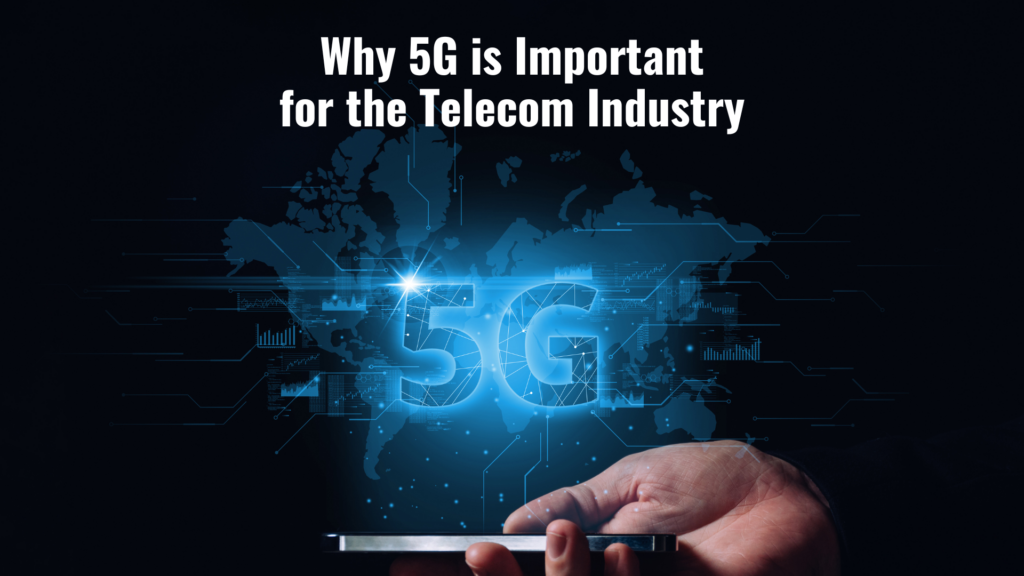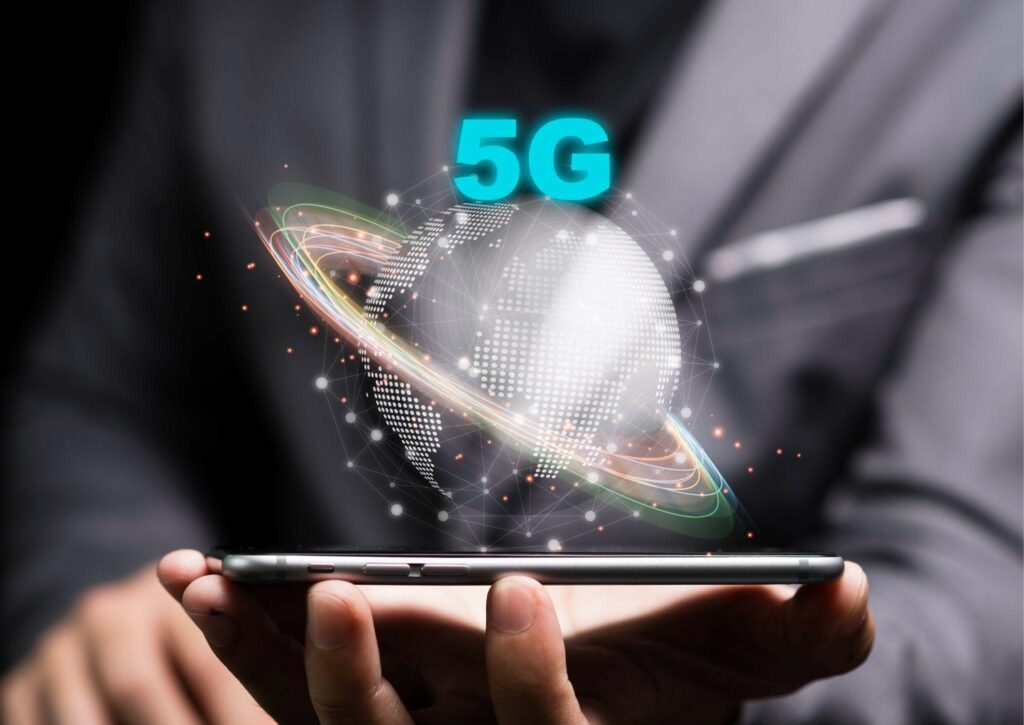The emergence of 5G wireless technology promises to revolutionize the telecom industry and change how we live and work. This post explores the impact of 5G on the telecom industry, which will profoundly affect virtually every aspect of our lives.
5G will change the way you communicate. It’s going to affect how we interact with our phones and tablets, and it even will have an impact on your home entertainment system. 5G will pave the way for a slew of new innovations that would not be possible without it.
The telecoms industry is undergoing a major transformation, with 5G being the next generation of wireless connectivity. So, What is it? How will it impact the telecom industry, and why 5G is important now?
So, without further delay, let’s start and discuss it!
Table of contents
- Overview
- Why 5G is Important
- The Impact of 5G on the Telecom Industry
- How 5G Will Impact Public Safety, Infrastructure, and Economic Development
- Pros and Cons of a 5G Deployment
- Conclusion
Overview
The telecom industry is constantly evolving and changing, and one of the biggest drivers of this change is the “G” – or generation – of wireless technology. Each new generation brings faster speeds, more capacity, and new features that make our lives easier and more connected.
The Impact of 5G on Telecom:
- The current state of broadband, 5G, and its implications
- Telecom providers’ spending plans
- The industry landscape and possible investment possibilities
Each new generation brings not only faster speeds but also more capacity for things like streaming video, downloading music, browsing the web, and using social media. And as we all know, people are using their smartphones for more than just making calls these days.
Also Read: How Mobile Technology Has Modernized the Construction Industry
Why 5G is Important for the Telecom Industry

In order for the telecom industry to keep up with the competition, they need to invest in 5G. Not only will this give them an edge over their competitors, but it will also allow them to offer their customers the latest and greatest technology.
5G is important because it offers a number of advantages over previous generations of wireless technology. For one, it has much higher speeds, which means that users will be able to do more with their devices.
In addition, it has lower latency, which means that there will be less lag when using 5G-enabled devices. 5G is more energy-efficient than previous generations, meaning that telecom companies can save money on their energy bills.
Overall, 5G represents a major step forward for the telecom industry. It offers faster speeds, lower latency, and more reliability. All of which are essential for the future development of new applications and services.
The Impact of 5G on the Telecom Industry

The deployment of 5G will have a massive impact on the telecom industry. The higher speeds and lower latency of 5G will enable new services and applications that were not possible before. This will lead to a major shift in the way telecom operators do business.
5G will also have a big impact on the network infrastructure. The current 4G infrastructure is not designed for the high speeds and low latency of 5G. To deploy 5G, telecom operators will need to upgrade their networks to support the new technology. This upgrade will be costly, but it is necessary to stay ahead of the competition.
The arrival of 5G will also trigger consolidation in the telecom industry. The high costs of deploying 5G will make it difficult for small players to survive. We expect to see a lot of mergers and acquisitions in the telecom sector in the next few years.
In many ways, 5G communication technology advances communication technology to meet changing demands, such as:
- Increased data-throughput rates
- Decreased latency
- Cost-cutting measures
- Energy conservation
- System capacity has been increased
- Massive concurrent device connectivity.
How 5G Will Impact Public Safety, Infrastructure, and Economic Development
The next generation of wireless technology, 5G, is expected to bring a number of benefits to the telecom industry, including improved public safety, infrastructure, and economic development.
5G will enable faster data speeds and lower latency, which will be critical for public safety applications such as live streaming of video from police body cameras and real-time monitoring of traffic conditions. 5G will also enable the deployment of new technologies such as smart city infrastructure and the Internet of Things (IoT), which can help improve the efficiency of city operations and lead to economic development.
In addition, 5G will have a positive impact on the environment by reducing energy consumption and enabling new green technologies such as electric vehicles.
Also Read: How Will 5G Transform Industrial IoT?
5G Use Cases in the Telecom Industry
The telecom industry is abuzz with the talk of 5G. This next-generation wireless technology promises to revolutionize the way we communicate and connect with the world around us. With speeds up to 100 times faster than 4G, 5G will enable new and innovative use cases that are not possible with today’s wireless networks.
Some of the most promising 5G use cases for the telecom industry include:
- Enhanced mobile broadband: 5G will provide a major boost to mobile broadband speeds, making it possible to stream high-definition video, download large files, and surf the web at lightning-fast speeds.
- Ultra-reliable low-latency communications: One of the key benefits of 5G is its ultra-low latency, which opens up new possibilities for mission-critical applications such as remote surgery, autonomous driving, and industrial robotics.
- Massive machine-type communications: The massive scale of 5G will enable new applications that require communication between large numbers of devices, such as smart cities and connected cars.
- Private LTE/5G networks: Private LTE/5G networks can be used by enterprises to build their own dedicated wireless networks for greater control and security.
- Fixed wireless access: 5G can be used to deliver high-speed internet access to homes and businesses without the need for cables or fiber optic lines.
Pros and Cons of a 5G in the Telecom Industry
The 5G is the next generation of wireless technology, and it promises a lot. But it also comes with potential risks that need to be considered. Here are some pros and cons of 5G in the telecom industry.
Pros:
Increased speed and capacity: 5G offers much higher speeds and capacity than previous generations of wireless technology. This will enable telecom providers to offer more reliable service and support more users.
Lower latency: 5G has the potential to significantly reduce latency, which is the delay between when a user sends a request and when they receive a response. This could make real-time applications like gaming and virtual reality possible.
More efficient use of spectrum: 5G can make better use of spectrum resources, which means that more users can be supported on the same network.
Cons:
Potential health risks: Some studies have linked exposure to radiofrequency radiation from devices like cell phones to cancer and other health problems. 5G technology would likely increase exposure levels, so more research is needed to understand the risks.
Interference with other equipment: 5G signals have been shown to interfere with weather radar and other types of sensitive equipment. This could cause major problems for industries that rely on this equipment, like air travel and emergency services.
Security concerns: 5G networks are expected to be much more complex than previous generations, which could make them more vulnerable to attacks.
Also Read: Role of Private 5G Networks in Industry 4.0
Conclusion
The impact of 5G on the telecom industry is far-reaching and will change the way we communicate forever. This new technology has the potential to revolutionize how we live, work, and play. 5G will enable faster speeds, lower latency, and more reliable connections than ever before. For telecom companies, this means a need for faster network infrastructure and higher capacity networks. The rollout of 5G will be a major undertaking for the telecom industry, but it is one that comes with great promise.
If you are interested in elevating your businesses using technology, connect with our industry experts at Aeologic Technologies.
Feel free to schedule a free 60-minute consultation with one of our experts. We’ll talk about the opportunities and address any concerns you may have. Our consultants will suggest solutions and outline how they can be implemented. Let’s talk!
Related Blogs:
- How AI/ML Can Change the Public Transportation Industry
- Transforming Business With Digital Technology in the Oil Palm Industry in India
- Importance of Digital Asset Management in the Retail Industry
- How AI is Transforming the Agriculture Industry
- 10 Ways to Use Artificial Intelligence to Improve Business Processes
- The Future of IoT Technology in Convenience Stores
- Building Manufacturing Resilience Through AI and ML









